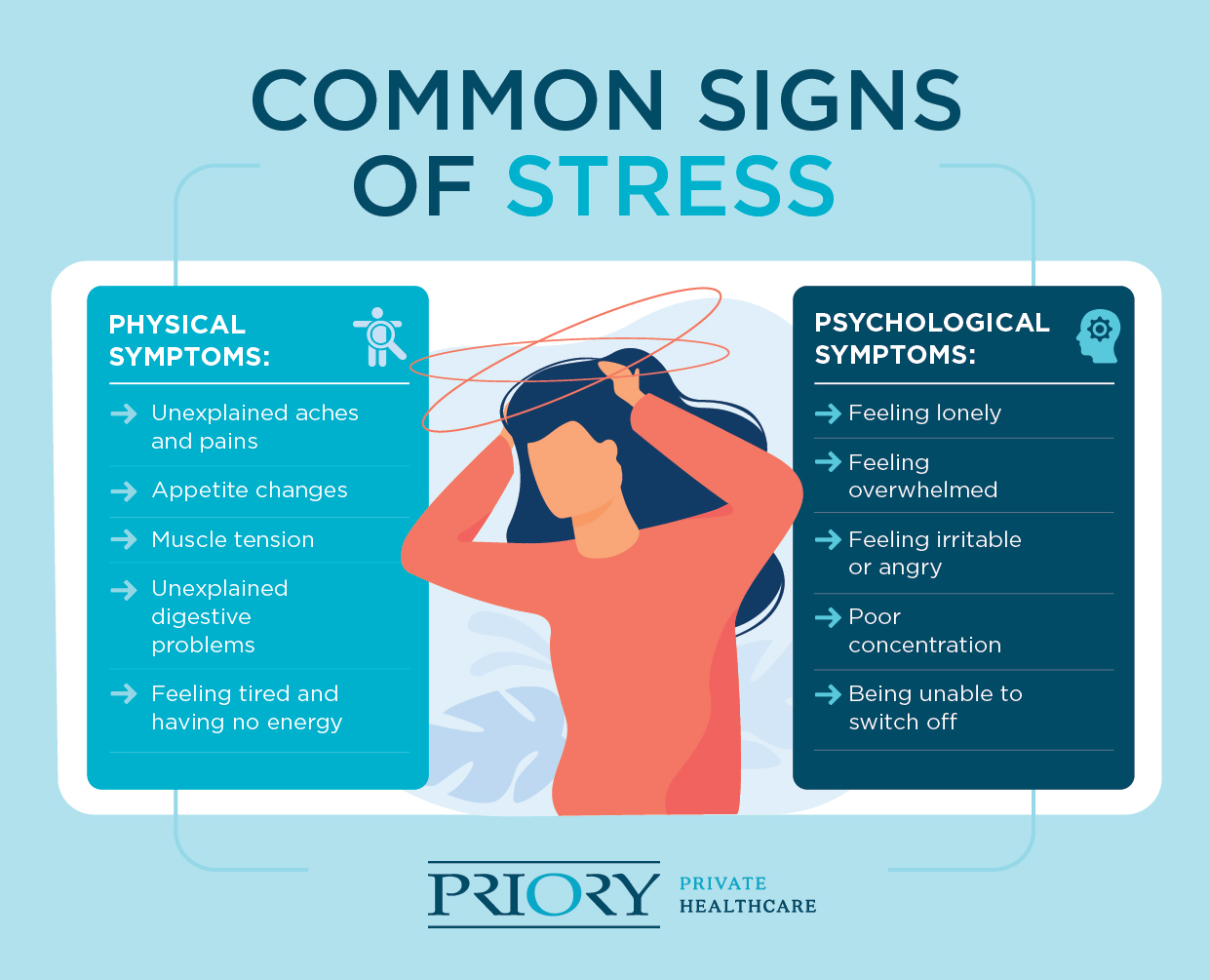Signs and symptoms of stress
Recognising the emotional, physical and behavioural signs and symptoms of stress can help you to take action early and seek the right support.
Stress is something we all experience and while it affects everyone differently, it tends to impact every part of us: how we think, feel, behave and how our body works.
Sometimes the signs are obvious, like feeling overwhelmed or struggling to sleep, while at other times, the signs are more subtle. While stress is a normal response to life’s pressures, it can become damaging when it’s long-lasting, severe and interferes with daily life.
Whether you’re concerned about your own stress levels or about someone close to you, knowing the signs of stress can help you or a loved one find support as soon as possible. To make things clear, we’ve broken down the common symptoms of stress into three areas: emotional, physical and behavioural.
Stress is the body’s natural response to perceiving pressure, threats or challenges. When these are perceived, our system goes into ‘fight-or-flight’ mode and releases certain hormones, such as cortisol and adrenaline, that prepare us to confront (fight) or escape (flight) the perceived danger.
Some stress can be positive (known as eustress) as it motivates and energises you and increases your performance. Positive stress is usually short-lived (acute) and feels within your ability to cope.
However, when stress becomes long-term (chronic) and starts to feel overwhelming or beyond your ability to cope, it’s a sign that something needs to change. If left unmanaged, it can give rise to a range of symptoms that can be damaging to your mental and physical health, relationships and ability to function.

Stress can cause various emotional, mental, physical and behavioural symptoms. Everyone’s experience of stress is different, however, there are certain symptoms and patterns that are commonly experienced.
These symptoms can look different depending on factors such as gender, age and life stage. For example:
Stress can cause various emotional and mental symptoms that may develop suddenly or gradually. They can affect your wellbeing, relationships, work and ability to function in daily life.
When the body releases stress hormones, it triggers physical changes to help us respond to pressure. These reactions are natural and while they can be helpful in short bursts, chronic stress can contribute to or exacerbate existing health conditions.
Stress can change the way you behave. While these behaviours are often attempts to cope, they can unintentionally make stress worse over time. You may notice an increase or decrease in certain behaviours, and sometimes it can trigger patterns you haven’t experienced before. For example:
If you’re feeling stressed, you’re not alone. Stress is common, with 74% of UK adults having felt overwhelmed by stress over the past year. However, with the right mix of self-care and professional support, it’s possible to recover from stress and feel more in control.
Simple techniques like deep breathing, mindfulness and progressive muscle relaxation can calm your nervous system. Physical exercise, a balanced sleep routine and diet, as well as talking to people you trust can help ease stress and reduce your mental load.
For extra guidance, Priory’s self-care hub offers practical tools, such as guided meditations and vagus nerve exercises, that you can try at home.
If stress is taking over your life, Priory’s private treatment programmes can give you the expert care, personalised strategies and dedicated support you need to regain balance and thrive. If you’re unsure about your stress levels, you can try our free stress symptoms test.
If you’re looking for free support, the NHS also offers various resources and helplines.
While they can be connected, stress and anxiety are different. Stress is the body’s response to pressure or threats, often linked to specific situations such as work or financial issues. Anxiety is a persistent feeling of fear or worry that doesn’t always have a clear cause and often continues, even when the immediate stressors are gone.
Stress symptoms can last anywhere from a few minutes, several weeks to years, depending on the situation and how you deal with it. Acute stress usually eases once the initial stressor has passed. Chronic stress, on the other hand, can linger and cause ongoing symptoms if the underlying causes aren’t addressed.
The first or early signs of stress can include poor sleep, tiredness and irritability. You may have more frequent headaches, tight shoulders or faster heartbeat, or notice that you’re less motivated at work or drink more to cope.
Yes, stress can directly affect the gut because stress hormones like adrenaline and cortisol are released. They might change how your digestive system works, potentially leading to stomach aches, indigestion, bloating, constipation, diarrhoea or irritable bowel syndrome (IBS).
Stress is a normal part of life but if it starts to affect your life and feels overwhelming or chronic, it might be time to seek professional support. You can speak to your GP or contact Priory for a mental health assessment. You don’t have to wait until things feel unmanageable to reach out – doing so early could prevent stress from getting worse.